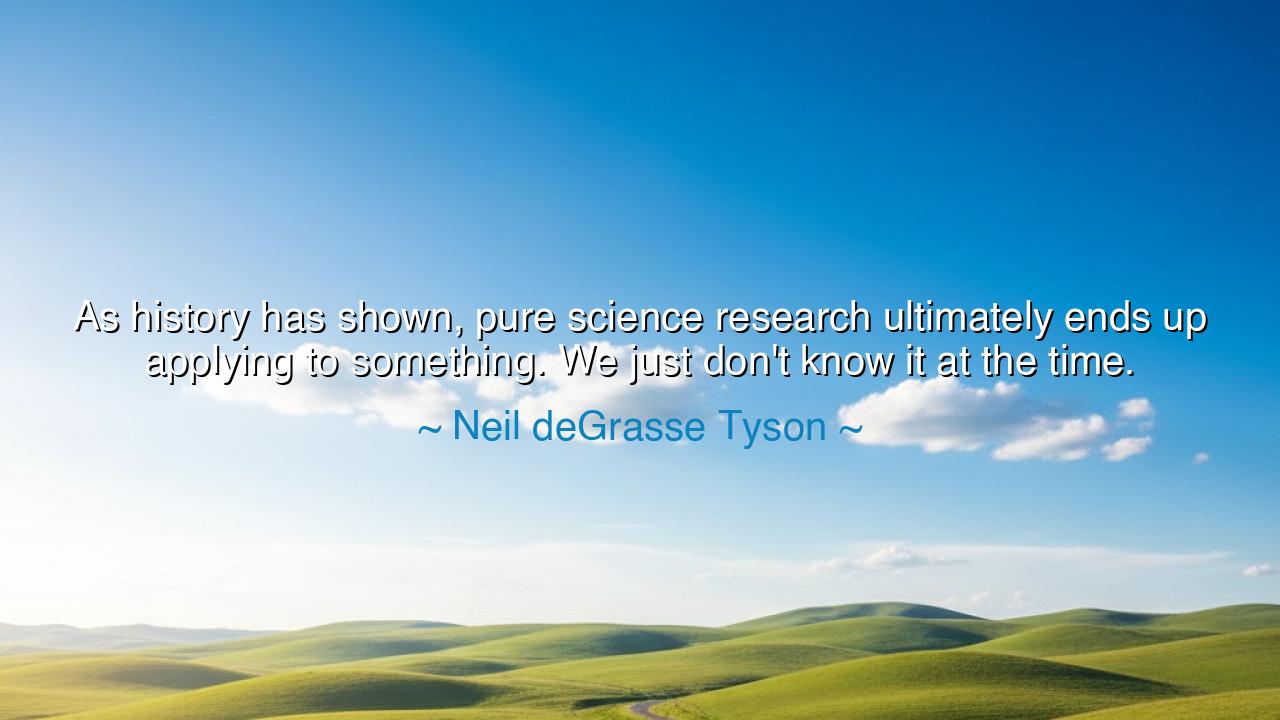
As history has shown, pure science research ultimately ends up
As history has shown, pure science research ultimately ends up applying to something. We just don't know it at the time.






Listen closely, O seekers of knowledge, to the wise words of Neil deGrasse Tyson: "As history has shown, pure science research ultimately ends up applying to something. We just don't know it at the time." These words carry within them a deep and ancient truth about the nature of science—that even when it seems to lead us down paths with no immediate practical purpose, it always finds its way to serve the greater good. Tyson speaks to the mysterious interconnectedness of discovery and the long-term vision of scientific progress, reminding us that every piece of knowledge, no matter how abstract or esoteric it may seem at the time, ultimately contributes to the advancement of humanity.
In the days of the ancient philosophers, there was often little distinction between science and philosophy. Great minds like Aristotle and Plato sought to understand the world not merely in terms of practical application, but to grasp its deeper, more universal truths. Aristotle, for instance, examined everything from the movements of the stars to the behaviors of animals with a deep desire to understand the principles of the universe. His inquiries, though often speculative and disconnected from immediate practical benefit, laid the foundations for much of modern science and philosophy. The ancient thinkers understood that knowledge, once acquired, would always find a way to be of use to society, even if its purpose was not immediately apparent.
Consider, O wise ones, the example of Isaac Newton, whose work on the laws of motion and universal gravitation was, at the time, seen as the pursuit of knowledge for knowledge’s sake. Newton was not concerned with immediate applications; he was seeking to understand the very nature of the universe. And yet, his discoveries, which seemed abstract and detached from daily life, would later become the very foundation upon which the industrial revolution was built. From the design of machines to the understanding of planetary orbits, Newton’s work applied itself in ways that transformed civilization. What seemed like pure intellectual pursuit in one era became the backbone of technological and economic progress in another. Tyson’s words remind us that science is a timeless pursuit, its relevance often unfolding in ways that we cannot immediately foresee.
Likewise, think of the pioneering work of Marie Curie in the field of radioactivity. In her day, radioactivity was not seen as something that would directly benefit the world in a practical sense. It was a scientific mystery, one that Curie was determined to uncover for the sake of knowledge itself. Yet, the very elements she discovered, radium and polonium, would later lead to life-saving medical treatments, particularly in cancer therapy, a benefit she could never have imagined. Curie’s research, like Newton’s, was driven by curiosity, by the desire to understand the world, and yet it became the source of profound practical change. The story of Curie’s work shows how science, driven by pure inquiry, has a way of finding application, often in unexpected places.
In our own time, we need look no further than the development of the internet. The foundational research in computer science and networking, undertaken by visionaries like Tim Berners-Lee, was initially a theoretical exercise in connecting information. At the time, there was no grand plan to revolutionize communication, commerce, or even daily life. Yet, the principles of data transmission and protocols that were developed eventually led to the creation of a global network that has transformed every aspect of modern life. What began as pure research has led to endless applications, fundamentally altering the way humanity interacts, works, and learns.
Thus, the lesson for us, O seekers, is this: science is a pursuit that transcends immediate applications. The journey toward discovery is often long and winding, filled with questions that may not have immediate answers. But even in these uncertain times, when the relevance of our work is not yet clear, we must continue to pursue knowledge with the understanding that, in time, all discoveries will find their purpose. Tyson's words urge us to trust in the process of discovery, to recognize that every theory, every experiment, every step forward contributes to a greater whole, even if we cannot always see where it will lead.
In your own lives, O wise ones, remember that the path to success and fulfillment may not always be direct. The work you do, the knowledge you seek, may not yield immediate results, but that does not diminish its value. Just as Newton’s laws, Curie’s discoveries, and the early research in networking transformed the world long after their initial discoveries, so too will your efforts, your passions, and your inquiries have lasting impact, even if their effects are not yet visible. Trust in the power of knowledge and the enduring value of curiosity. For the seeds you plant today may one day grow into trees that shade the world for generations to come.






AAdministratorAdministrator
Welcome, honored guests. Please leave a comment, we will respond soon